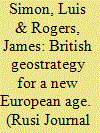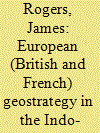|
|
|
Sort Order |
|
|
|
Items / Page
|
|
|
|
|
|
|
| Srl | Item |
| 1 |
ID:
104764


|
|
|
|
|
| Publication |
2011.
|
| Summary/Abstract |
For decades, European security has been assured by a grand, Anglo-American inspired political and economic project on the continent. Today, there is a risk that the old certainties are unravelling. In a previous RUSI Journal article, Luis Simón and James Rogers warned of the new risks in Europe; now, the authors offer a strategy for Britain to retain its vital place at the crux of an open, liberal European system.
|
|
|
|
|
|
|
|
|
|
|
|
|
|
|
|
| 2 |
ID:
121101


|
|
|
|
|
| Publication |
2013.
|
| Summary/Abstract |
The rise and integration of the Indian Ocean region and the Pacific rim over the past decade - into an 'Indo-Pacific' zone - and the emerging competition between the region's major powers, has drawn increasing attention. However, France and the United Kingdom, while long established in the Indo-Pacific, are often overlooked, even though they are both themselves starting to refocus on the region. Paris has consolidated a 'quadrilateral' of interlocking military stations, which runs down the western Indian Ocean, while London has boosted its 'strategic array', a collection of military facilities, logistical hubs and regional partners and allies, stretching from the Eastern Mediterranean to South-East Asia. Although fiscally under pressure, both countries seem determined to maintain their influence in the Indo-Pacific, but will nonetheless have their work cut out as emerging powers seek to boost their own respective positions in the region. Thus, the two European powers' ability to remain significant actors will depend on their willingness to coordinate with one another and other allies to focus their geopolitical awareness; create new partnerships with the rising Indo-Pacific countries; and provide the necessary resources to maintain - or better, bolster - their naval reach.
|
|
|
|
|
|
|
|
|
|
|
|
|
|
|
|
| 3 |
ID:
122185


|
|
|
|
|
| Publication |
2012.
|
| Summary/Abstract |
The melting of the Arctic ice has seen a renewed focus on the High North by many countries seeking influence there, including the UK. However, James Rogers argues that UK policy-makers should now look beyond this region to the emerging 'Wider North', to which the UK will eventually be connected by sea as the Arctic opens up further. If it is to become the 'strategic pivot' of this new geopolitical grouping - as Rogers suggests - the UK should actively foster stronger ties with both the Northern European countries of the Wider North as well as those in Asia, like Japan and South Korea.
|
|
|
|
|
|
|
|
|
|
|
|
|
|
|
|
| 4 |
ID:
096996


|
|
|
| 5 |
ID:
190872


|
|
|
|
|
| Summary/Abstract |
Transformations, revolutions, evolutions, call them what you will. The simple fact is that the global proliferation of weaponised drones – known as the Second Drone Age – has altered the face of warfare in the 2020s. This is not to say that theoretical debates about what constitutes a true “revolution” in war are unimportant; more that the purpose of this article is to outline the clear ways in which armed drones have altered the practice of contemporary warfare. The broader academic debates will be left to those who wish to wage what Colin Gray called “protracted internecine combat” across the old “happy hunting ground” of “revolutionary” debates.Footnote1 Instead, by focusing on the context specific empirics of armed drone deployments, by both state and non-state actors, key characteristics of the Second Drone Age will be outlined, and the growing impact of drones in warfare documented.
|
|
|
|
|
|
|
|
|
|
|
|
|
|
|
|
|
|
|
|
|